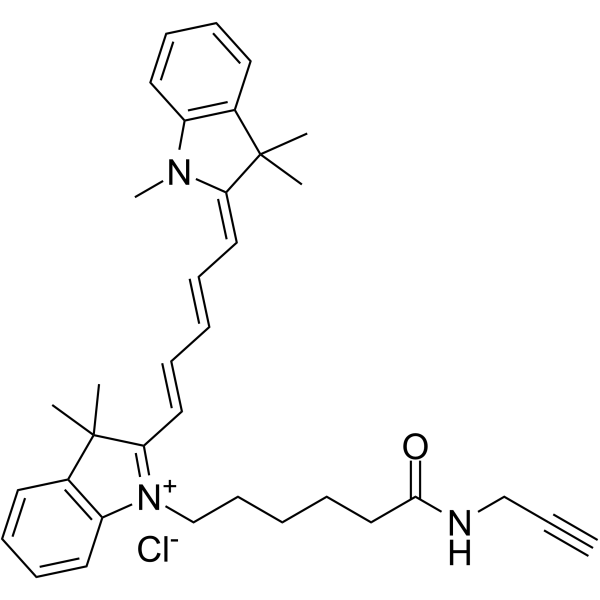1223357-57-0
| Name | 3,3-Dimethyl-1-[6-oxo-6-(2-propyn-1-ylamino)hexyl]-2-[(1E,3E,5E)-5-(1,3,3-trimethyl-1,3-dihydro-2H-indol-2-ylidene)-1,3-pentadien-1-yl]-3H-indolium chloride |
|---|---|
| Synonyms |
3H-Indolium, 2-[(1E,3E,5E)-5-(1,3-dihydro-1,3,3-trimethyl-2H-indol-2-ylidene)-1,3-pentadien-1-yl]-3,3-dimethyl-1-[6-oxo-6-(2-propyn-1-ylamino)hexyl]-, chloride (1:1)
3,3-Dimethyl-1-[6-oxo-6-(2-propyn-1-ylamino)hexyl]-2-[(1E,3E,5E)-5-(1,3,3-trimethyl-1,3-dihydro-2H-indol-2-ylidene)-1,3-pentadien-1-yl]-3H-indolium chloride |
| Description | Cyanine5 alkyne (Alkyne-Cy5) is a fluorescent dye used to label azide proteins and can be used to analyse post-translational modifications of proteins, glycosylation etc. Cyanine5 alkyne can also be used as a mitochondrial OXPHOS inhibitor to inhibit the growth of cancer stem cells (CSC)[1][2]. |
|---|---|
| Related Catalog | |
| In Vitro | Cyanine5 alkyne (Alkyne-Cy5) (1-1000 nM) significantly inhibits 3D mammosphere formation in MCF7 cells between 500 nM and 1000 nM and can act as a mitochondrial oxidative phosphorylation (OXPHOS) inhibitor, inducing glycolysis to compensate for mitochondrial ATP depletion[2]. |
| References |
| Molecular Formula | C35H42ClN3O |
|---|---|
| Molecular Weight | 556.180 |
| Exact Mass | 555.301636 |
